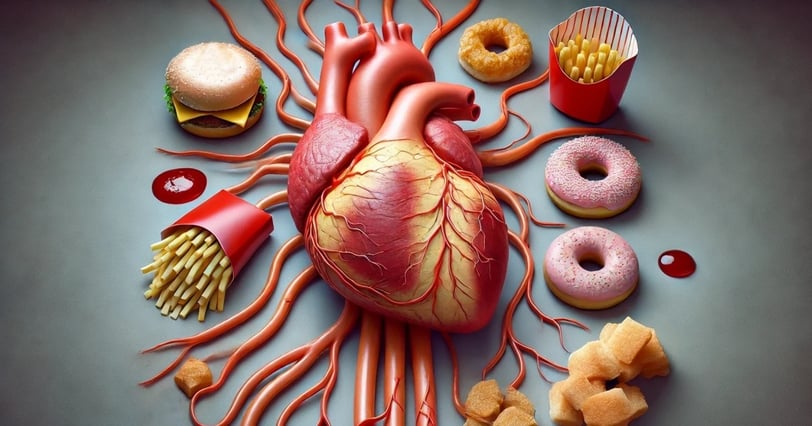The Hidden Dangers of Trans Fats: Why You Should Avoid Them
Discover why trans fats are so dangerous and how they increase the risk of heart disease. Learn how to avoid these harmful fats and make healthier choices
INGREDIENTSHEALTHY CHOICES
Healthatize
8/18/20243 min read


Trans fats, once a common ingredient in processed foods, have been increasingly recognized as one of the most harmful types of fat you can consume. These artificial fats are known to raise bad cholesterol levels, significantly increasing the risk of heart disease and other serious health issues. This article explores why trans fats are so dangerous and why you should eliminate them from your diet.
What Are Trans Fats?
Trans fats, or trans-fatty acids, are a type of unsaturated fat that is uncommon in nature but prevalent in processed foods. There are two types of trans fats:
Naturally-Occurring Trans Fats:
Found in small amounts in some animal products, such as dairy and meat. These are produced in the stomachs of certain animals.Artificial Trans Fats:
Also known as industrial trans fats, these are created through a process called hydrogenation, which solidifies liquid vegetable oils. This process extends the shelf life of food products and improves texture, making trans fats a popular ingredient in many processed foods.
Artificial trans fats are commonly found in:
Packaged baked goods (cookies, cakes, pastries)
Fried foods (fries, doughnuts)
Margarines and shortening
Processed snacks (crackers, chips)
How Trans Fats Affect Your Health
The health risks associated with trans fats are well-documented. Even small amounts of trans fats can have a significant impact on your health, particularly when it comes to heart disease.
Increased Bad Cholesterol (LDL):
Trans fats raise the levels of low-density lipoprotein (LDL) cholesterol in your blood. LDL is often referred to as "bad" cholesterol because it contributes to plaque buildup in the arteries, which can lead to atherosclerosis—a hardening and narrowing of the arteries.Lowered Good Cholesterol (HDL):
Not only do trans fats increase bad cholesterol, but they also lower high-density lipoprotein (HDL) cholesterol, which is known as "good" cholesterol. HDL helps remove LDL from the arteries, so a reduction in HDL can exacerbate the buildup of plaque.Increased Risk of Heart Disease:
The combination of higher LDL and lower HDL levels significantly raises the risk of developing heart disease, the leading cause of death worldwide. Consuming trans fats regularly can also increase the risk of stroke.Other Health Risks:
Beyond heart disease, trans fats have been linked to a variety of other health issues, including insulin resistance, which can lead to type 2 diabetes, and inflammation, which is associated with a range of chronic conditions.
How to Avoid Trans Fats
Given the serious health risks, it's crucial to minimize or eliminate trans fats from your diet. Here’s how you can avoid them:
Read Food Labels Carefully:
Always check the ingredient list for "partially hydrogenated oils," which is the primary source of artificial trans fats. Even if a product claims to be "trans fat-free," it can contain up to 0.5 grams of trans fat per serving if partially hydrogenated oils are listed.Choose Whole Foods:
Opt for whole, unprocessed foods whenever possible. Fresh fruits, vegetables, whole grains, and lean proteins are naturally free of trans fats.Cook at Home:
By preparing meals at home, you can control the ingredients and avoid trans fats commonly found in processed and fast foods.Use Healthier Fats:
Replace trans fats with healthier alternatives such as olive oil, avocado oil, and coconut oil. These fats are not only free of trans fats but also offer health benefits.
Trans fats are among the most harmful substances you can consume, significantly increasing the risk of heart disease by raising bad cholesterol levels and lowering good cholesterol. By being vigilant about what you eat and making healthier choices, you can protect your heart and overall health. Eliminating trans fats from your diet is a crucial step toward a healthier lifestyle.
This article is designed to be SEO-friendly, incorporating relevant keywords related to trans fats, cholesterol, and heart disease. It provides readers with actionable advice on how to avoid trans fats and improve their health.
